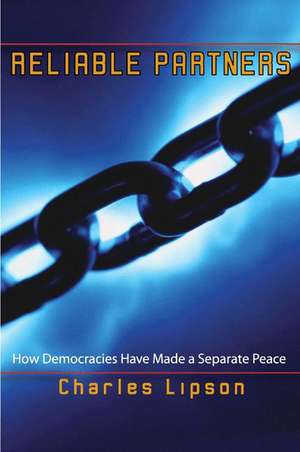Reliable Partners – How Democracies Have Made a Separate Peace
Autor Charles Lipsonen Limba Engleză Paperback – 28 feb 2005
Why are democracies more reliable partners? Because their politics are uniquely open to outside scrutiny and facilitate long-term commitments. They cannot easily bluff, deceive, or launch surprise attacks. While this transparency weakens their bargaining position, it also makes their promises more credible--and more durable, for democracies are generally stable. Their leaders are constrained by constitutional rules, independent officials, and the political costs of abandoning public commitments. All this allows for solid bargains between democracies. When democracies contemplate breaking their agreements, their open debate gives partners advance notice and a chance to protect themselves. Hence agreements among democracies are less risky than those with nondemocratic states. Setting rigorous analysis in friendly, vigorous prose, Reliable Partners resolves longstanding questions about the democratic peace and highlights important new findings about democracies in world politics, from rivalries to alliances. Above all, it shows conclusively that democracies are uniquely adapted to seal enduring bargains with each other and thus avoid the blight of war.
Preț: 351.27 lei
Nou
Puncte Express: 527
Preț estimativ în valută:
67.23€ • 69.92$ • 56.26£
67.23€ • 69.92$ • 56.26£
Carte tipărită la comandă
Livrare economică 15-29 martie
Preluare comenzi: 021 569.72.76
Specificații
ISBN-13: 9780691122779
ISBN-10: 0691122776
Pagini: 272
Ilustrații: 2 line illus. 4 tables.
Dimensiuni: 160 x 234 x 17 mm
Greutate: 0.39 kg
Editura: Princeton University Press
Locul publicării:Princeton, United States
ISBN-10: 0691122776
Pagini: 272
Ilustrații: 2 line illus. 4 tables.
Dimensiuni: 160 x 234 x 17 mm
Greutate: 0.39 kg
Editura: Princeton University Press
Locul publicării:Princeton, United States
Notă biografică
Charles Lipson is Professor of Political Science at the University of Chicago, where he founded and codirects PIPES, the Program on International Politics, Economics, and Security. He is the author of Standing Guard: Protecting Foreign Capital in the Nineteenth and Twentieth Centuries.
Descriere
Why do democracies avoid fighting each other? This book examines research and speculation on the subject and tests this against the history of relations between democracies over two centuries. It concludes that constitutional democracies have a 'contracting advantage' - a unique ability to settle conflicts with each other by durable agreements.
